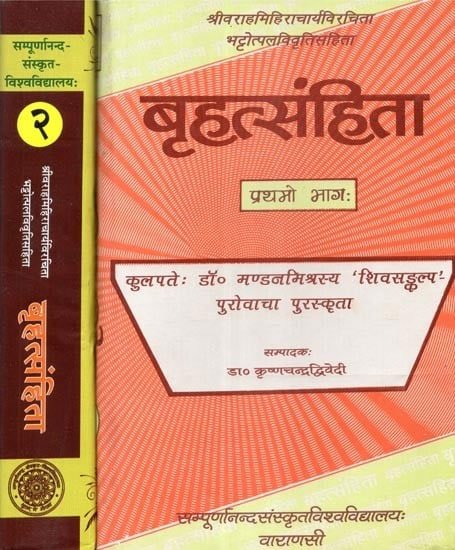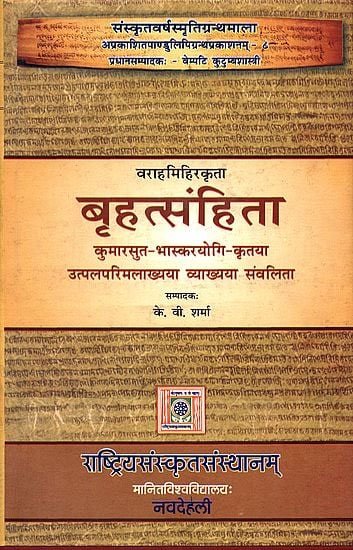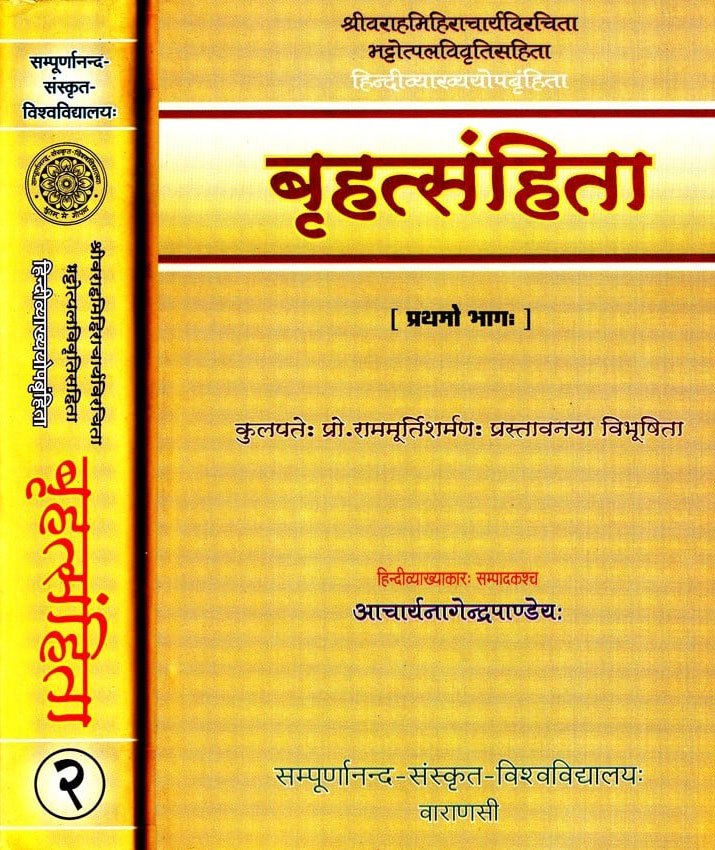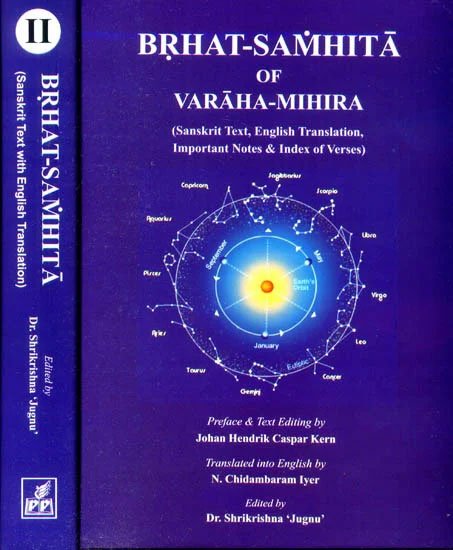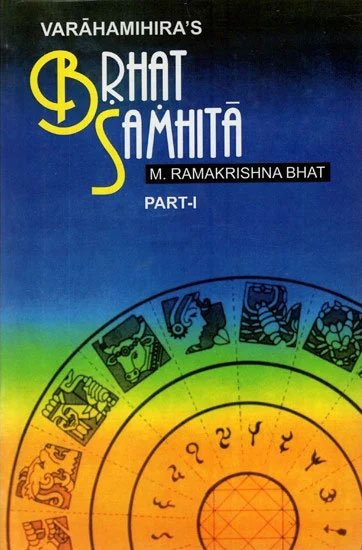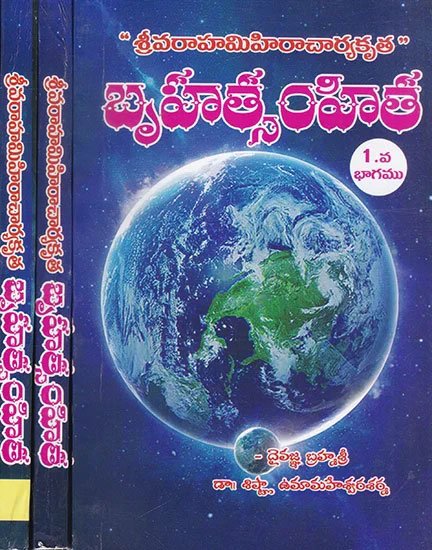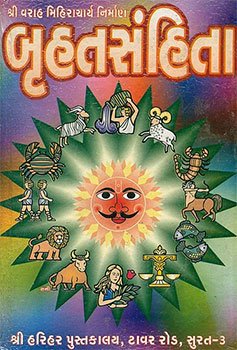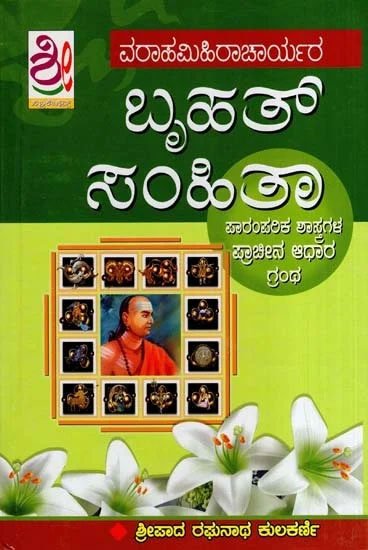Brihat-samhita [sanskrit]
26,560 words
The Sanskrit text of the Brihat-samhita from the 6th-century authored by Varaha Mihira in present-day Ujjain, India. It primarily deals with astrology and astronomy but is presented as an encyclopedia of knowledge.
Verse 27.2
पूर्वः पूर्वसमुद्रवीचिशिखरप्रस्फालनाघूर्णितश्चन्द्रार्कांशुसटाकलापकलितो वायुर्यदाकाशतः ।
नैकान्तस्थितनीलमेघपटला शारद्यसंवर्धिता वासन्तोत्कटसस्यमण्डिततला सर्वा मही शोभते ॥ २ ॥
[अभिघात । पटलां । संवर्धितां । तलां विद्यात्तदा मेदिनीम्]
pūrvaḥ pūrvasamudravīciśikharaprasphālanāghūrṇitaścandrārkāṃśusaṭākalāpakalito vāyuryadākāśataḥ |
naikāntasthitanīlameghapaṭalā śāradyasaṃvardhitā vāsantotkaṭasasyamaṇḍitatalā sarvā mahī śobhate || 2 ||
[abhighāta | paṭalāṃ | saṃvardhitāṃ | talāṃ vidyāttadā medinīm]
The Sanskrit text of Verse 27.2 is contained in the book Brihata Samhita (Sanskrit Text with Hindi Translation) by Pandit Achyutananda Jha. This book is available online or you could buy the latest edition:
Read online Buy now! The Sanskrit text by Pandit Achyutananda Jha (2001)
Glossary of Sanskrit terms
Note: This extracts Sanskrit terms and links to English definitions from the glossary, based on an experimental segmentation of verse (27.2). Some terms could be superfluous while some might not be mentioned. Click on the word to show English definitions.
Purva, Purvasamudra, Vici, Shikhara, Pra, Sphalana, Aghurnita, Candrarka, Sata, Kalapa, Kalita, Vayu, Yada, Yad, Akasha, Tas, Naika, Sthita, Nilamegha, Sharadya, Samvardhita, Vasanta, Utkata, Sasya, Mandita, Tala, Saru, Sarva, Mahi, Mahin, Shobhat, Abhighata, Patala,
Analysis of Sanskrit grammar
Note: this is an experimental feature and only shows the first possible analysis of the Sanskrit text (Verse 27.2). If the system was successful in segmenting the sentence, you will see of which words it is made up of, generally consisting of Nouns, Pronouns, Verbs, Participles and Indeclinables. Click on the link to show all possible derivations of the word.
- Line 1: “pūrvaḥ pūrvasamudravīciśikharaprasphālanāghūrṇitaścandrārkāṃśusaṭākalāpakalito vāyuryadākāśataḥ ”
- pūrvaḥ -
-
pūrva (noun, masculine)[nominative single]
- pūrvasamudra -
-
pūrvasamudra (noun, masculine)[compound], [vocative single]
- vīci -
-
vīci (noun, feminine)[compound], [adverb]vīcī (noun, masculine)[adverb], [vocative single]vīcī (noun, feminine)[compound], [adverb], [vocative single]vīcī (noun, neuter)[compound], [adverb], [nominative single], [vocative single], [accusative single]
- śikhara -
-
śikhara (noun, masculine)[compound], [vocative single]śikhara (noun, neuter)[compound], [vocative single]
- pra -
-
pra (noun, masculine)[compound], [vocative single]pra (noun, neuter)[compound], [vocative single]
- sphālanā -
-
sphālana (noun, neuter)[compound], [vocative single]
- āghūrṇitaś -
-
āghūrṇita (noun, masculine)[nominative single]
- candrārkā -
-
candrārka (noun, masculine)[compound], [vocative single]
- aṃśu -
-
aṃśu (noun, masculine)[compound], [adverb]
- saṭā -
-
saṭā (noun, feminine)[nominative single]
- kalāpa -
-
kalāpa (noun, masculine)[compound], [vocative single]
- kalito* -
-
kalita (noun, masculine)[nominative single]√kal -> kalita (participle, masculine)[nominative single from √kal class 1 verb], [nominative single from √kal class 10 verb]
- vāyur -
-
vāyu (noun, masculine)[nominative single]vāyu (noun, feminine)[nominative single]√vā (verb class 2)[optative active third plural]
- yadā -
-
yadā (indeclinable adverb)[indeclinable adverb]yadā (indeclinable relative)[indeclinable relative]yadā (indeclinable)[indeclinable]yad (noun, masculine)[instrumental single]
- ākāśa -
-
ākāśa (noun, masculine)[compound], [vocative single]ākāśa (noun, neuter)[compound], [vocative single]
- taḥ -
-
tas (noun, masculine)[compound], [vocative single]tas (noun, neuter)[compound], [nominative single], [vocative single], [accusative single]ta (noun, masculine)[nominative single]
- Line 2: “naikāntasthitanīlameghapaṭalā śāradyasaṃvardhitā vāsantotkaṭasasyamaṇḍitatalā sarvā mahī śobhate || 2 |”
- naikān -
-
naika (noun, masculine)[accusative plural]
- ta -
-
ta (noun, masculine)[compound], [vocative single]ta (noun, neuter)[compound], [vocative single]tan (noun, masculine)[compound]
- sthita -
-
sthita (noun, masculine)[compound], [vocative single]sthita (noun, neuter)[compound], [vocative single]√sthā -> sthita (participle, masculine)[vocative single from √sthā class 1 verb]√sthā -> sthita (participle, neuter)[vocative single from √sthā class 1 verb]
- nīlamegha -
-
nīlamegha (noun, masculine)[compound], [vocative single]nīlamegha (noun, neuter)[compound], [vocative single]
- paṭalā -
-
- śāradya -
-
śāradya (noun, neuter)[compound], [vocative single]
- saṃvardhitā* -
-
saṃvardhita (noun, masculine)[nominative plural], [vocative plural]saṃvardhitā (noun, feminine)[nominative plural], [vocative plural], [accusative plural]
- vāsanto -
-
vāsanta (noun, masculine)[compound], [vocative single]vāsanta (noun, neuter)[compound], [vocative single]
- utkaṭa -
-
utkaṭa (noun, masculine)[compound], [vocative single]utkaṭa (noun, neuter)[compound], [vocative single]
- sasya -
-
sasya (noun, masculine)[compound], [vocative single]sasya (noun, neuter)[compound], [vocative single]√sas -> sasya (absolutive)[absolutive from √sas]sa (noun, neuter)[genitive single]
- maṇḍita -
-
maṇḍita (noun, masculine)[compound], [vocative single]maṇḍita (noun, neuter)[compound], [vocative single]√maṇḍ -> maṇḍita (participle, masculine)[compound from √maṇḍ]√maṇḍ -> maṇḍita (participle, neuter)[compound from √maṇḍ]√maṇḍ -> maṇḍita (participle, masculine)[vocative single from √maṇḍ class 1 verb], [vocative single from √maṇḍ]√maṇḍ -> maṇḍita (participle, neuter)[vocative single from √maṇḍ class 1 verb], [vocative single from √maṇḍ]
- talā -
-
talā (noun, feminine)[nominative single]
- sarvā* -
-
saru (noun, feminine)[ablative single], [genitive single]sarva (noun, masculine)[nominative plural], [vocative plural]sarvā (noun, feminine)[nominative plural], [vocative plural], [accusative plural]
- mahī -
-
mahī (noun, feminine)[compound], [nominative single]mahi (noun, masculine)[nominative dual], [vocative dual], [accusative dual]mahi (noun, feminine)[nominative dual], [vocative dual], [accusative dual]mahin (noun, masculine)[nominative single]
- śobhate -
-
√śubh -> śobhat (participle, masculine)[dative single from √śubh class 1 verb]√śubh -> śobhat (participle, neuter)[dative single from √śubh class 1 verb]√śubh (verb class 1)[present middle third single]
- Cannot analyse 2
- Line 3: “[abhighāta | paṭalāṃ | saṃvardhitāṃ ”
- abhighāta -
-
abhighāta (noun, masculine)[compound], [vocative single]abhighāta (noun, neuter)[compound], [vocative single]
- paṭalā -
-
paṭala (noun, masculine)[compound], [vocative single]paṭala (noun, neuter)[compound], [vocative single]
- am -
-
a (noun, masculine)[adverb], [accusative single]ā (noun, feminine)[adverb]e (noun, masculine)[accusative single]
- saṃvardhitām -
-
saṃvardhitā (noun, feminine)[accusative single]
Other editions:
Also see the following editions of the Sanskrit text or (alternative) English translations of the Verse 27.2
Brhatsamhita with the Commentary of Bhattotpala
by Krishna Chandra Dwivedi (2016)
Publisher: Sampurnanand Sanskrit University; 1229 pages;
Buy now!
Brihat Samhita with the Commentary of Utpalapatimala of Yogisvara
by K. V. Sharma (2012)
Publisher: Rashtriya Sanskrit Sansthan, Janakpuri; 754 pages; ISBN-10; 8186111360; ISBN-13: 9788186111369
Buy now!
Brihat Samhita (Hindi Translation)
by K. V. Sharma (2002)
Publisher: Sampurnanand Sanskrit University; 2359 pages; ISBN-13: 9789387890008.
Buy now!
Brhat Samhita (English translation)
by N. Chidambaram Iyer (2022)
Publisher: Parimal Publication Pvt. Ltd.; 801 pages; Edited by Dr. Shrikrishna Jugnu; ISBN-10: 8171104215; ISBN-13: 9788171104215.
Buy now!
Brhat Samhita (English with notes)
by M. Ramakrishna Bhat (2010)
Publisher: Motilal Banarsidas Publishers Pvt. Ltd.; 1155 pages; ISBN-10: 8120810600; ISBN-13: 9788120810600.
Buy now!
Brhat Samhita (Telugu translation)
by Sishtla Umamaheswara Sharma (2020)
Publisher: Mohan Publications, Andhra Pradesh; 846 pages.
Buy now!Preview of verse 27.2 in Kannada sript:
ಪೂರ್ವಃ ಪೂರ್ವಸಮುದ್ರವೀಚಿಶಿಖರಪ್ರಸ್ಫಾಲನಾಘೂರ್ಣಿತಶ್ಚನ್ದ್ರಾರ್ಕಾಂಶುಸಟಾಕಲಾಪಕಲಿತೋ ವಾಯುರ್ಯದಾಕಾಶತಃ ।
ನೈಕಾನ್ತಸ್ಥಿತನೀಲಮೇಘಪಟಲಾ ಶಾರದ್ಯಸಂವರ್ಧಿತಾ ವಾಸನ್ತೋತ್ಕಟಸಸ್ಯಮಣ್ಡಿತತಲಾ ಸರ್ವಾ ಮಹೀ ಶೋಭತೇ ॥ ೨ ॥
[ಅಭಿಘಾತ । ಪಟಲಾಂ । ಸಂವರ್ಧಿತಾಂ । ತಲಾಂ ವಿದ್ಯಾತ್ತದಾ ಮೇದಿನೀಮ್]
Brhat Samhita (Gujarati translation)
by - (2000)
Publisher: Shree Harihar Pustakalay, Surat; Author: Shri Varahamihira Acharya (શ્રી વરાહમિહીરાચાર્ય); 432 pages.
Buy now!Preview of verse 27.2 in Gujarati sript:
પૂર્વઃ પૂર્વસમુદ્રવીચિશિખરપ્રસ્ફાલનાઘૂર્ણિતશ્ચન્દ્રાર્કાંશુસટાકલાપકલિતો વાયુર્યદાકાશતઃ ।
નૈકાન્તસ્થિતનીલમેઘપટલા શારદ્યસંવર્ધિતા વાસન્તોત્કટસસ્યમણ્ડિતતલા સર્વા મહી શોભતે ॥ ૨ ॥
[અભિઘાત । પટલાં । સંવર્ધિતાં । તલાં વિદ્યાત્તદા મેદિનીમ્]
Brhat Samhita (Kannada translation)
by Sripada Raghunatha Kulkarni (2021)
Publisher: Srinidhi Publications, Bangalore; 668 pages with illustrations.
Buy now!Preview of verse 27.2 in Kannada sript:
ಪೂರ್ವಃ ಪೂರ್ವಸಮುದ್ರವೀಚಿಶಿಖರಪ್ರಸ್ಫಾಲನಾಘೂರ್ಣಿತಶ್ಚನ್ದ್ರಾರ್ಕಾಂಶುಸಟಾಕಲಾಪಕಲಿತೋ ವಾಯುರ್ಯದಾಕಾಶತಃ ।
ನೈಕಾನ್ತಸ್ಥಿತನೀಲಮೇಘಪಟಲಾ ಶಾರದ್ಯಸಂವರ್ಧಿತಾ ವಾಸನ್ತೋತ್ಕಟಸಸ್ಯಮಣ್ಡಿತತಲಾ ಸರ್ವಾ ಮಹೀ ಶೋಭತೇ ॥ ೨ ॥
[ಅಭಿಘಾತ । ಪಟಲಾಂ । ಸಂವರ್ಧಿತಾಂ । ತಲಾಂ ವಿದ್ಯಾತ್ತದಾ ಮೇದಿನೀಮ್]
![Brihat-samhita [sanskrit] - book cover](/uploads/a/Brihat-Samhita-Sanskrit.jpg)
